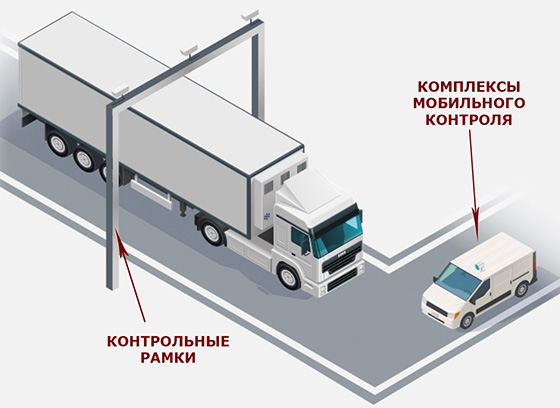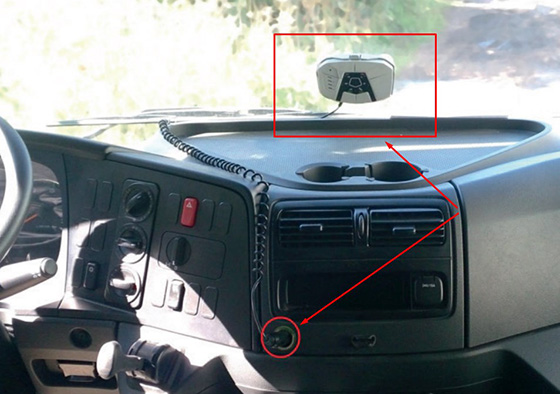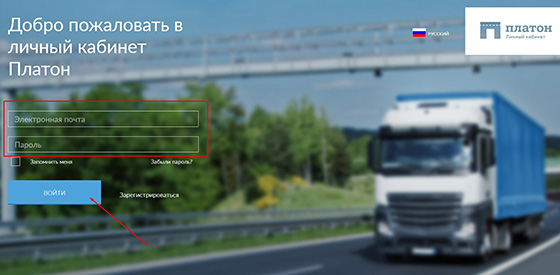Plato toll system for road travel for trucks weighing more than 12 tons
“Platon” is a system designed to collect fees for road repairs from owners of trucks whose weight together with the cargo is more than 12 tons.
The main goal of introducing the Platon system is to cover the damage caused to Russian roads due to the passage of overloaded freight vehicles.
The calculation of the amount that the owner of a cargo vehicle covered by the system must pay depends directly on the total mileage of the truck for a specific time period.
According to forecasts, by the end of the year the country's budget will receive about 20 billion rubles from the system, part of this income will be transferred to the operator (which is RT-Invest Transport Systems) to cover the costs associated with ensuring operation.
Implementation history
By the end of 2013, the number of heavy trucks registered in the Russian Federation reached 1.7 million, and taking into account transit trucks, a total of about 2 million vehicles with a maximum permissible weight exceeding 12 tons used the roads of the Russian Federation.
After carrying out the necessary calculations, it was determined that in order to maintain the automobile infrastructure, it is necessary to introduce an additional tax paid by the owners of vehicles that cause the greatest damage to the road surface.
In 2014, the collection of applications for servicing the future system began. Initially, foreign operators were allowed to participate in the competition, but due to a change in the foreign policy situation, a concession agreement was concluded in August 2014 between the Federal Road Agency and the RT-Invest Transport Systems company.
Video presentation of the Plato system:
In November 2014, the government proposed to tax the movements of trucks, while fees from the movements of vehicles with a maximum permissible weight of more than 12 tons were to be sent to regional budgets and funds responsible for promoting partnerships between private and public structures.
On May 18, 2015, an amendment was made to Resolution No. 504 of 06/04/13, according to which the fee for 1 kilometer increased to 3 rubles 73 kopecks (the previous value was 3.5 rubles).
Government Decree No. 1191 dated November 3, 2015 established the need to apply a coefficient of 0.41 to the previously indicated amount of payment per 1 kilometer. Thus, the toll for 12-ton trucks dropped to 1.53 rubles per kilometer.
Video - explanations of the President of the Russian Federation about the principles of work of “Plato” (in December 2015):
Review of legislation
The emergence and functioning of “Plato” is ensured by the following legislative acts:
- Federal Law No. 257 (8.11.07) “On highways and road activities in the Russian Federation.”
- Federal Law No. 68 (6.04.11) on amendments.
- Decree of the Government of the Russian Federation No. 504 of June 14, 2013 (as amended by No. 1191 of November 3, 2015). The text of this resolution defines the harm caused by heavy vehicles to the road system of the Russian Federation, and provides justification for the need to charge fees to owners of trucks with a maximum permissible weight of more than 12 tons.
- Order of the Government of the Russian Federation No. 1662-r (08.29.14). This document defines the RT-Invest Transport Systems company as the operator ensuring the stable functioning of the Platon system.
- Decree of the Government of the Russian Federation No. 1191 (03.11.15). The text of the document explains some issues related to the introduction and work of Plato.
Who is obliged to pay through the Platon system for road travel?
Owners of vehicles whose maximum permitted weight (the weight of the vehicle together with the maximum load allowed for it) exceeds 12 tons are required to pay tolls on federal highways of the Russian Federation.
Tariffs and conditions
The first amount, indicated in Resolution No. 504 (06/14/13) and received after carrying out the necessary calculations by the expert group, was 3.5 rubles per kilometer; subsequently, the fee was increased to 3.73 rubles for every 1000 meters run.
Resolution No. 1191 (03.11.15), determined for the period until February 29, 2016, a coefficient of 0.41 to the previously adopted tariff, thus, the price of one kilometer for heavy-duty transport decreased to RUB 1.53/km. Resolution No. 139 dated February 27, 2016 extended the validity period of this preferential tariff. It is valid for cars with a maximum permissible weight of over 12 tons today.
The government plans to increase the tariff first to 3.06 rubles per kilometer, then to 3 rubles 73 kopecks per 1000 meters (after 2018).
It is worth noting that some categories of transport with a maximum permitted weight of more than 12 tons are exempt from paying fees to the Platon system. These vehicles include the following types of transport:
- Vehicles used for transporting people (this does not include vans intended for transporting both people and goods);
- Vehicles used for the needs of medical, law enforcement, fire, rescue services and military aviation, equipped with sound and light signaling devices specified by the Road Traffic Rules;
- Vehicles used to transport weapons and military equipment.
Users can use tax deduction— reduce transport tax by the amount paid to the Platon system.
Fines
According to the text of Decree of the Government of the Russian Federation No. 504 (06/14/13), fines can be levied on owners and drivers of heavy vehicles driving on federal highways without paying a fee. This formulation is divided into several cases:
- the driver moves along a federal highway with a faulty or switched-off on-board unit without informing the Operator in advance and without paying the toll in advance;
- the driver is driving a vehicle without an on-board unit, and there are no funds in the personal account of the owner of the heavy truck in an amount sufficient to pay;
- changing the route or time of its passage without informing the Operator and in the absence of an on-board device;
- continuing to move along the highway in the absence of funds to pay for the movement on the personal account.

According to Federal Law No. 378-FZ of December 14, 2015, which amended the Code of Administrative Offenses of the Russian Federation, the following fines are established for violations:
- 5000 rubles— a fine for driving on federal roads without paying a fee for drivers of vehicles of foreign cargo carriers and for owners (owners) of Russian vehicles;
- 10,000 rubles for repeated violation.
In accordance with Article 12.21.3 of the Code of Administrative Offenses of the Russian Federation:
“The movement of a vehicle with a permissible maximum weight of over 12 tons on public roads of federal significance without paying a fee to compensate for the damage caused to public roads of federal significance by such a vehicle, if payment of such a fee is mandatory, shall entail the imposition of an administrative fine :
- in the amount of 5,000 (five thousand) rubles for drivers of vehicles owned by foreign carriers;
- in the amount of 5,000 (five thousand) rubles for the owners (possessors) of vehicles, with the exception of vehicles owned by foreign carriers.
Repeated commission of this administrative offense entails the imposition of an administrative fine:
- in the amount of 10,000 (ten thousand) rubles for drivers of vehicles owned by foreign carriers;
- in the amount of 10,000 (ten thousand) rubles for the owners (owners) of vehicles, with the exception of vehicles owned by foreign carriers.”
In this case, a fine may be issued to the vehicle. only for one violation per day.
Principle of operation
Drivers who own a vehicle with a maximum permissible weight of more than 12 tons (or owners of such vehicles who entrust their driving to other drivers) must be registered on the official website of the Platon system.
Payment for completed trips is carried out both in the mode of advance payments and postpayment.
The movement of heavy trucks around the clock is studied by system operators using GPS and GLONASS satellites, using control frames and mobile control systems (vehicles with system symbols on the roadside, usually Lada Largus).
If facts of travel on federal highways without payment are detected, the System Operator transmits information to law enforcement agencies, which record the fact that an administrative offense has been committed and determine the amount of the fine for violators.
What is an on-board device
On-board unit is a special device that is attached to a cargo vehicle and transmits information about its movements and location to the Platon system server via GPS and GLONASS satellites.

Video - how the Plato on-board device works:
More detailed information can be found in the on-board device user manual -.
What is a route map
Route map is a document that records the route of a cargo vehicle along federal roads and is provided by the owner of the heavy truck in advance of the trip. Based on the data entered in the route map, the amount of payment for the truck owner is calculated.
Service centers
The service center is a place where the owner or driver of a heavy-duty vehicle can receive up-to-date information about the functioning of the Platon system, register a personal account or his truck, replenish the balance of a personal account, make changes to the data contained in the personal account, obtain an on-board unit, and also perform many other actions.
Official website of the Platon toll collection system
Before starting to work with the Platon system, the user is recommended to visit the official website of the Platon system (platon.ru) and study the information available there.
The official website briefly describes the functioning and development of the system, contains information about the main elements of the system, the payment procedure for drivers and vehicle owners, and contains a list of basic regulatory documents.
If the user has any difficulties while familiarizing himself with the site, he can contact the “Questions and Answers” section.
Personal Area
All operations with the system can be carried out by the owner of the vehicle or its driver in the Personal Account.

To register and log into your personal account, follow the LINK.
Video - login to the user’s personal account of the Plato system, profile and requests section:
The Platon personal account is adapted for use by people who are little familiar with communication technologies: the site is not overloaded with information and is intuitive to use.
Video - the vehicles section when entering your personal account on the Platon website:
In your Personal Account, route maps are created, payments are made for completed or planned trips, and information about vehicles owned by the Carrier is edited.
You can download instructions for working in your personal account.
Registration procedure
- Selecting the “Registration” button on the official website of the system.
- Selecting the type of cargo vehicle and user status.
- Entering the required information.
- Sending information for verification by the Operator.
Payment options
- debiting funds from the system user’s LAN;
- making a transfer of non-cash funds using the details specified on the official website;
- payment by bank card (via personal account or terminals);
- debiting funds from fuel cards (DKV, E100).
Video instructions for using the terminals of the Platon toll collection system for heavy trucks:
Helpdesk phone number
Toll-free hotline for Platon support service 8-800-550-02-02 works around the clock, you can get answers to all your questions.
Forums and user reviews
Reviews, opinions and advice from those who use Plato can be found on various forums. One of them is the “oplatone.ru” forum (oplatone.ru).
Trucker protests and latest news
Truckers, like no one else, have felt all the “delights” of the introduction of tolls for trucks on the roads. After numerous protests throughout the country, the government decided to reduce the fare and revise some other points relative to those initially approved.
Increasingly, through their public and trade union organizations, truckers are proposing to look for optimal solutions regarding transport taxes and road tolls.
Video - a truck driver’s reasoned response to the proposal to increase tariffs of the Platon system (hearings in the Public Chamber):
When assessing the benefits that “Plato” provides to the state and its citizens, a phrase that has already become popular is increasingly heard: we wanted it to be good, but it turned out as always.
